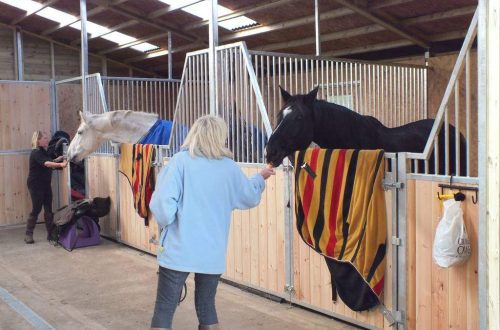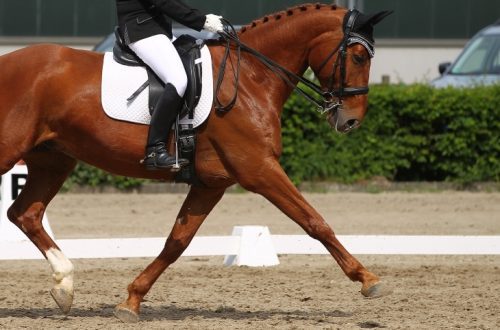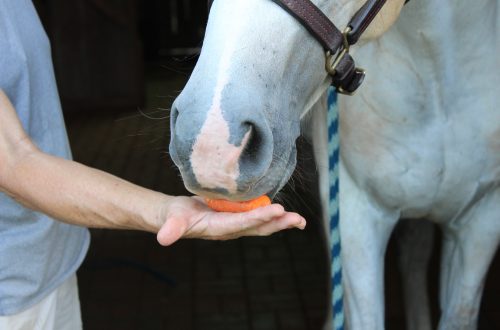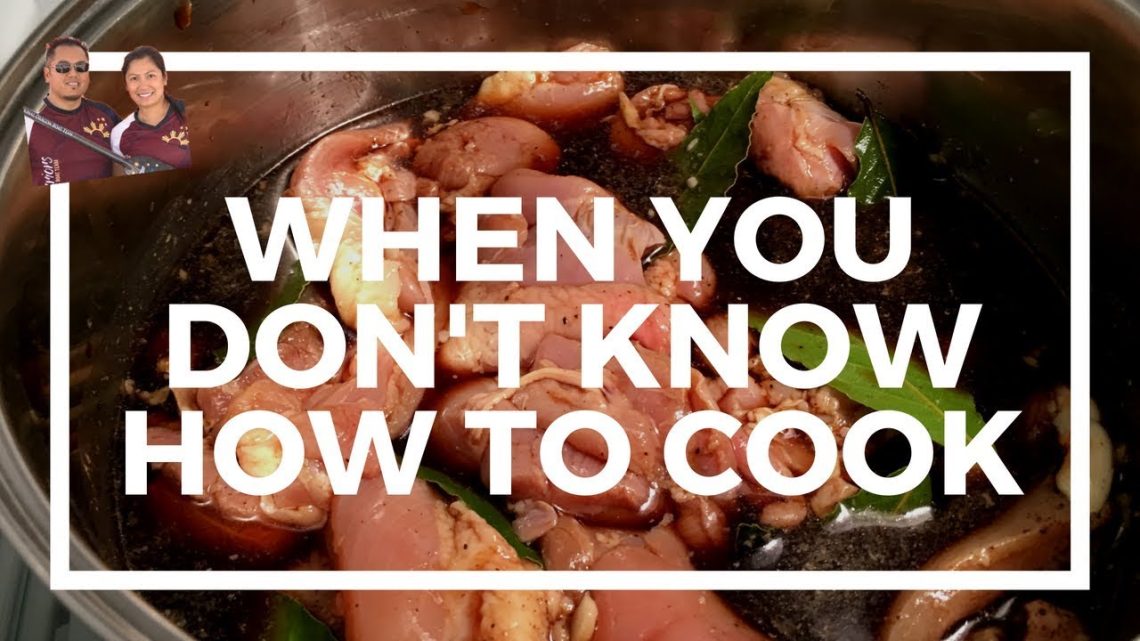
Opinion: We just don’t know how to cook them?
Opinion: We just don’t know how to cook them?
Many are wondering: why are our riders not in competitive positions in the world of equestrian sport? Perhaps this is the result of the ill-conceived work of domestic breeders or an illiterate approach to preparing horses? The only horse that has reached the leading Olympic positions over the past 20 years is the Oryol trotter Balagur! But why did not the hopes for acquiring expensive imported horses come true? What’s the matter? Where are the victories? Where is the breakthrough?
Anya Beran, Lydia Artamonova, Alexandra Korelova, Nikolai Korolkov, Anna Dorofeeva, Nona Garson give their comments on these issues.
Lydia Artamonova. “One happy event: at the last European championship among children aged 12-15, our team won, two athletes got the best results. But one of them lives, trains and studies in Holland, and the other in Spain. What does this prove? That our children are very good, talented, but in Russia there is no one to work with them. And as soon as they got to Holland and Spain, the result immediately appeared … “
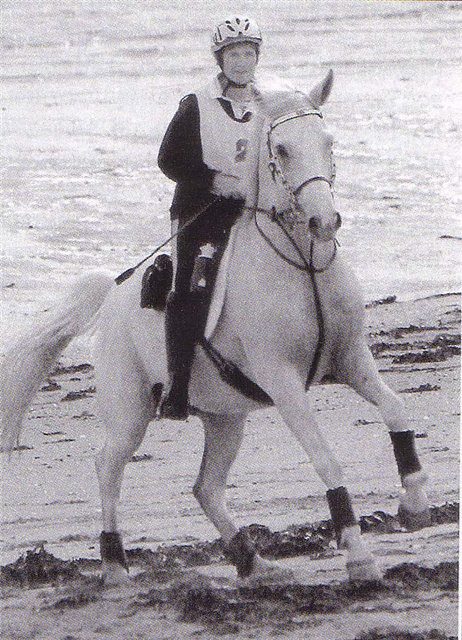
Candy Cameron and her Terts (UK)
Nikolai Korolkov. ““The main topical issue”: all, as one, the leading Russian show jumpers claim that modern Russian horses are worse than Western ones.
This is usually said by people who travel to the West for horses and earn money by selling them in Russia. But it would be worth looking at the work of athletes, because the horse itself does not jump. Flight, Espadron … Yes, we have a lot of such horses! No one to go. There is no competent horse dressage, training, culture.
The success of the Germans is a foregone conclusion, starting with their care of horses, feeding. How do they work youngsters? Our young horse is standing, not training, and then they sat on it and drove off …
And the fields? We don’t have competitive fields. The whole of Aachen is the size of our Bataysk, but there are about 40 arenas! And now we have only one field in Rostov, where both pentathletes and triathletes train. There are rentals, and private traders, and dressage … there is no longer a place for show jumping … ”
Nona Garson (Top show jumper of the USA who performed on Budyonnovtsy): “Having got acquainted with the horses of the Budennovskaya breed, I saw a huge potential in them. Interest in these horses will grow and grow. I performed well with several Budennovites and I hope that I will perform more. These horses can compete with Western breeds, and I think that Russian people have no idea what treasure they have next to them.”
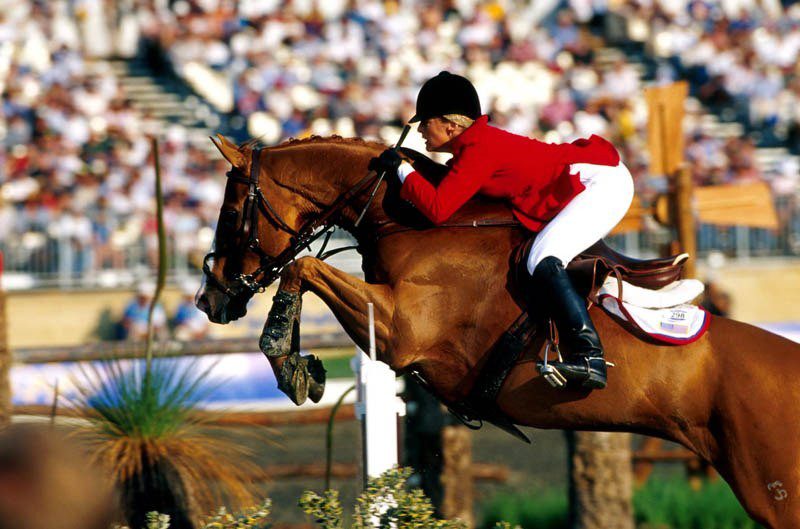
Budyonnovets Ritmikal (Rhythmic) under the saddle of Nona Garson USA
Anna Dorofeeva. “It’s not about the quality of domestic horses, but the current situation in domestic sports, when it is more profitable to buy a ready-made horse abroad. You can buy the “super elite” of the German, Dutch or Belgian horse breeding, but if there is no one to ride at the European level and then perform, corresponding to the best riders in Europe in terms of landing mechanics, understanding of calculation, psychological preparation, then this is a direct path to ruin.
The French once closed their championships from imported horses, moreover, the national team was formed from horses bred exclusively in France. Now they have their own breed and developed equestrian sport. In America, for the development of show jumping, large cash awards for prizes were established. In Italy, the Federation pays extra to athletes who qualify with Italian horses.”
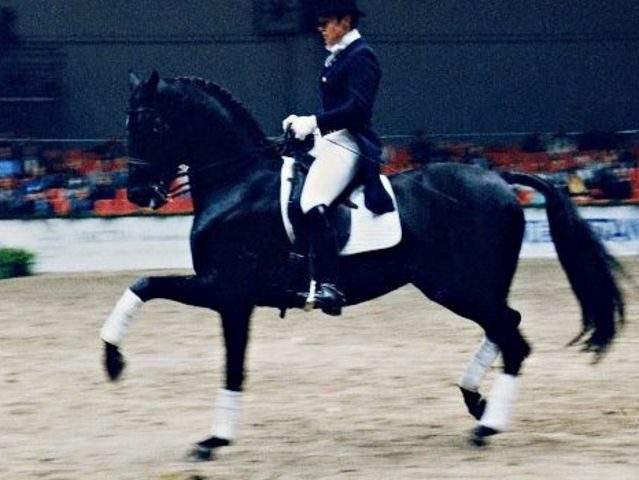
Kira Kerklund on Edinburgh from Stavropol from Trakehner Elever and Tersk mare.
Aleksandra Korelova: “I can’t draw conclusions about all Western farms. But at least where I was, the horse is not forced to do anything by force. She is taught, led to ensure that everything works out, everything is logical. We often require a horse to perform exercises for which, for whatever reason, it is not ready. Our Russian “must” is very disturbing.
The same Great Britain, Germany, Holland are countries where there is an equestrian industry. There is no need to run around and look for good hay, oats and a good free veterinarian. We do not have the opportunity to easily go to the clinic. There is no need here and now. Veterinary technologies of the proper level are used only in two or three clinics, which are located only in Moscow. In other regions, they do not exist in principle. However, even in Moscow clinics they do not work according to European technologies. For example, we treat horses, and they prevent them. We treat after they are already sick, and they do prophylaxis, preventing diseases.”
I want from myself add one personal observation about another domestic breed and approach to it – the Russian riding. This is definitely a great horse. Its creator, Vadim Parfyonov, once said that this horse is very flexible, with a natural passage and piaffe, and it is very easy to break and spoil it. It is customary for us to train the horse for elements, and not to systematically prepare the horse for them. RWP is the horse of balance. If she is straightforward, free in movement, which comes from the work of the back and croup, then psychologically she will be the most devoted friend, partner.
But RVP horses strongly resist, experiencing movement discomfort, stiffness, lack of straightness. I had to hear enthusiastic opinions of foreigners about RVP and humiliating opinions from compatriots. While the foreigner leveled the horse step by step, correcting the flaws of factory work, our compatriot hooked a sliding rein to the RVP and threw the horse to the front. The foreigner got the result, ours got the sick horse.
Probably the plant itself should be engaged in the primary gymnastics of the horse, its development, strengthening cooperation with it. At the department, during one of the conferences on RVP, questions arose: why the plant itself does not deal with the sensible basic development of young animals, why does it not train specialists, trusting horses to unfortunate breeders? There were no replies…
The fate of the Russian riding Renoir (Blues), a stallion born in 1990, is indicative. Behind his croup wins in many dressage competitions in the United States under the saddle of Patricia Desi, thanks to the talent of Alexander Shcherba.
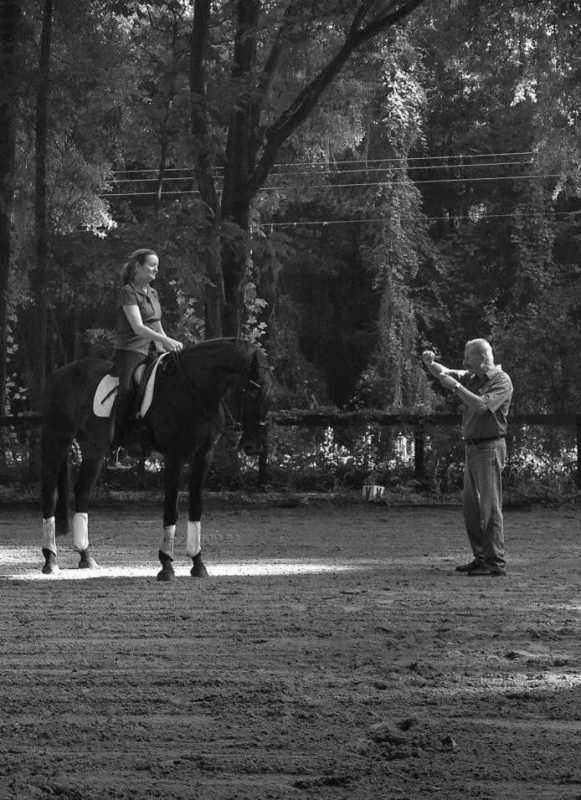
On the website of his mistress about Renoir it is written: “This is a special horse. It was prepared in Russia by Valery Volkov and imported to the US at the age of 8. His Russian name is Blues (Blyooz). His father Barin was a member of the USSR dressage team in the 80s. Renoir earned me a number of gold and silver awards.”
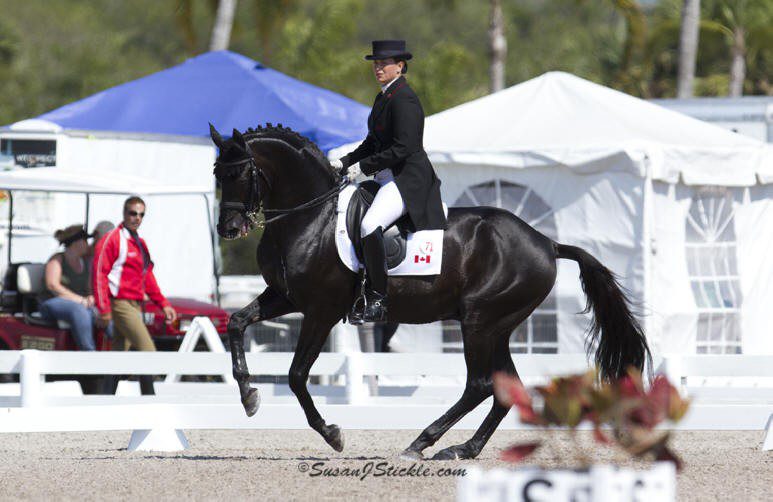
Russian riding Apricot and Canadian rider – Denielle Gallagher-LeGriffon
Valera Sablia
- Brodyaga 20 April 2017 city
Not in the eyebrow, but in the eye! Answer
- Foreman 26 April 2017 city
and do not argue the main thing. And after the last sensational video and KSK Bitts, you still think whether we have professionals at all in the Russian Federation or there is no one left besides the departing old people .. Answer



